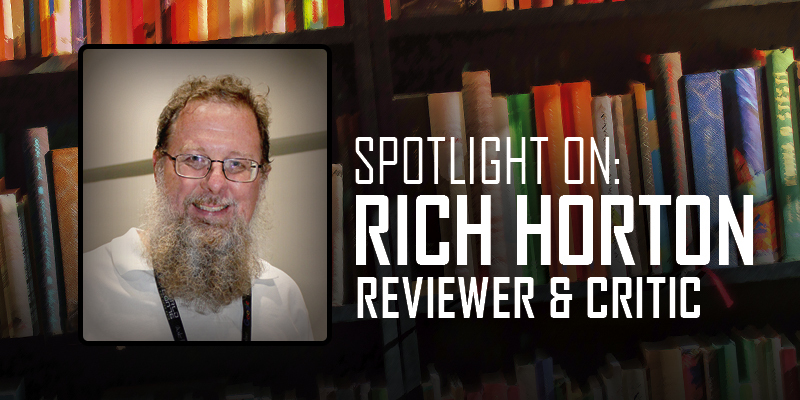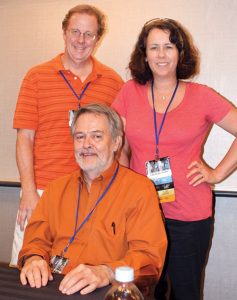Spotlight on: Rich Horton

You started reviewing short fiction for Locus in the February 2002 issue, 20 years ago. What a career! What’s the origin story for you as a reviewer; what brought you into this?
I started reviewing for the short fiction reviewzine Tangent – back when it was a print fanzine. Dave Truesdale posted a notice somewhere saying he was looking for reviewers, and I thought, ‘‘I like short fiction’’ – even then I was reading all the magazines I could find – ‘‘and I can write about it.’’ I sent him a note, and he sent me a couple of the most awful saddle-stapled ’zines you can imagine, and I wrote them up (pulling no punches, I think.) I guess he liked what I wrote, because pretty soon he started letting me review Asimov’s and Analog and F&SF and so on.
This coincided with the widespread adoption of the internet, and I had discovered a few online places devoted to SF (Dueling Modems, SFF.net, and the great Usenet newsgroup rec.arts.sf.written, primarily.) I realized right away that I loved ‘‘talking’’ about SF – the sense of community, of passion, of shared knowledge and shared interests I found in those places was electric. Some of the friends I made there are still friends (even though many of them I have still never met in real life!) Writing for Tangent – and later Locus – was another way to participate in this great conversation.
I soon started posting ‘‘Best of the Year’’ and ‘‘Hugo Nomination’’ lists, and people seemed to like it. I made some good choices, too – I picked Kelly Link’s first story as a nomination choice, saying something like, ‘‘This writer is someone to watch!’’ I think I got that right! Before long Locus had a website, run by my friend and predecessor Mark R. Kelly. (Indeed, for a while Mark and I worked for the same corporation, and we could even email each other at work.) Mind you, I had been faithfully reading Mark’s columns since they started. He asked me to contribute some pieces to Locus Online – still some of the best work I’ve done, I think.
When Mark decided he’d had enough of the regular column, he suggested me to Charles Brown as a possible replacement. Charles gave me a call, and I said, ‘‘That sounds great! Let me think about it.’’ I called Dave Truesdale, and told him I had an offer to take over the Locus column, but I didn’t want to leave him in the lurch. He told me I was an idiot, and I should say yes. So I did!
Why retire your column now?
A lot of things…. I’ve been doing this for 20 years, which I believe is about twice as long as Mark did. Nick Gevers did a parallel column for several years, then Gardner Dozois took over. (Gosh, I miss Gardner.) Recently Karen Burnham has taken up a lot of the load, and of course Paula Guran has been reviewing horror/dark fantasy for a long time. That is another way of saying – there are other great voices to hear about short fiction! So that’s one reason. It’s not that I have nothing more to say about short SF – I do and will! – but my thoughts and my tastes are well known. It will be great to see yet another perspective.
But it’s more than that. Perhaps the biggest reason is that there is so much else I want to read. I am perpetually behind on novels, for instance – why didn’t I read something as delightful as, say, The Goblin Emperor by Katherine Addison until this year? Partly because I didn’t have time. I have other reading interests – I love Victorian novels, and early 20th-century popular fiction, and Ace Doubles, and even contemporary fiction. I’ll be reading a lot of that. There are personal reasons too. As I write these words, my second grandchild is due in a week, with a third grandchild due six months later. I already delight in my first granddaughter, Adelaide, surely the cutest one-year-old in the world… so I expect three times the delight by the end of next year!

How do you think the short fiction field has changed in your two decades of close reading? What are the through lines?
It’s a cliché to say this, but it’s still true – the field has gotten far more diverse. Diverse voices should be a no-brainer for SF – if we’re the field that portrayed alien intelligences with glee, surely we should have no trouble welcoming creators from other cultures? But it took us a while to get where we are now.
In terms of styles – what has changed? In general I think that divisions between subgenres have become more porous. I started at Locus at the height of the slipstream fashion: I follow Bruce Sterling in thinking of slipstream as a fairly specific mode – or indeed mood – of storytelling, but many people interpreted it as ‘‘fiction that mixes subgenres.’’ That mode has become more and prevalent: SF that presents as fantasy, or fantasy that mixes in SF, or stories that don’t seem to care about genre or subgenre. I hasten to add, that sounds dismissive, but I don’t mean it that way: It can be very powerful. (It can also be done badly.) Great examples of this sort of genre mixing, to my mind, are Yoon Ha Lee’s Machineries of Empire series and Tamsyn Muir’s Gideon the Ninth.
In terms of theme? Even back then, and still to this day, I notice a fascination with posthumanity, and also with different kinds of intelligence, particularly artificial intelligence. It’s hard for me to say, though, whether that’s really something that’s a trend in the field, or something that speaks particularly to me.
Looking back over your tenure, are there any particular stories that have stuck with you through the years?
So, my favorite thing! To celebrate the great stuff I’ve read. I have a little list, in publication order (and I’m sure I’ve forgotten some, and that the list would change a bit if I wrote it tomorrow): ‘‘Lull’’ by Kelly Link, ‘‘The Path of the Transgressor’’ by Tom Purdom, ‘‘The Voluntary State’’ by Christopher Rowe, ‘‘Pip and the Fairies’’ by Theodora Goss, ‘‘The House Beyond Your Sky’’ by Benjamin Rosenbaum, ‘‘Three Days of Rain’’ by Holly Phillips, ‘‘Tenbrook of Mars’’ by Dean McLaughlin, ‘‘Exhalation’’ by Ted Chiang, ‘‘Eros, Philia, Agape’’ by Rachel Swirsky, ‘‘The Maiden Flight of McCauley’s Bellerophon’’ by Elizabeth Hand, ‘‘A Small Price to Pay for Birdsong’’ by K.J. Parker, ‘‘A Guide to the Fruits of Hawai’i’’ by Alaya Dawn Johnson, ‘‘Sadness’’ by Timons Esaias, ‘‘Mutability’’ by Ray Nayler, ‘‘Everyone From Themis Sends Letters Home’’ by Genevieve Valentine, The Dream-Quest of Vellitt Boe by Kij Johnson, ‘‘Empty Planets’’ by Naomi Kanakia, ‘‘An Account of the Land of Witches’’ by Sofia Samatar, ‘‘Dayenu’’ by James Sallis, ‘‘Green Glass: A Love Story’’ by E. Lily Yu, ‘‘Laws of Impermanence’’ by Ken Schneyer, ‘‘Crazy Beautiful’’ by Cat Rambo, and ‘‘If the Martians Have Magic’’ by P. Djèlí Clark. (I limited myself to one story per author, which means I didn’t mention such other favorites such as ‘‘The Faery Handbag’’, ‘‘Magic for Beginners’’, ‘’26 Monkeys, also the Abyss’’, ‘‘The Sandal-Bride’’, ‘‘Cimmeria: From the Journal of Imaginary Anthropology’’, and some more.)
 You’ve also edited numerous anthologies over the years, including a long run of Year’s Best volumes. Will you continue your work as an anthologist?
You’ve also edited numerous anthologies over the years, including a long run of Year’s Best volumes. Will you continue your work as an anthologist?
My publisher willing, I will be continuing my series of Best of the Year anthologies, and I certainly hope to be publishing additional anthologies. Right now I am working on a very ambitious book for MIT Press, with Eric Schwitzgebel & Helen de Cruz, which will collect, we hope, the very best philosophical science fiction from all over the world, and all time. (Eric and Helen are both philosophy professors and published SF writers.)
Now that you don’t have to read scores of SF magazines every month, what are you looking forward to reading?
Well, as I said above – a lot of novels! I’ll get closer to keeping up with SF in long form. I have an ARC of C.S.E. Cooney’s Saint Death’s Daughter, for example, that I’m just raring to read. Add M. Rickert’s The Shipbuilder of Bellfairie, and Nadia Afifi’s The Sentient, and On Fragile Wings by E. Lily Yu, and The Unraveling, by Benjamin Rosenbaum…. Why don’t I just glance at my (literal) TBR pile: Barchester Towers by Anthony Trollope, Golden Hill by Francis Spufford, The Underground Railroad by Colson Whitehead, The Finkler Question by Howard Jacobson, Laughter in the Dark by Vladimir Nabokov, Jack by Marilynne Robinson, My Antonia by Willa Cather, The Moonstone by Wilkie Collins, Big Sky by Kate Atkinson, Black Leopard, Red Wolf by Marlon James, Lord Byron’s Novel: The Evening Land by John Crowley, The Tale of Genji by Murasaki Shikibu, Anna Karenina by Leo Tolstoy, The Betrothed by Alessandro Manzoni… and really the TBR pile is much taller!
Do you have any parting words for our readers?
Thanks, of course, for reading what I’ve written over the years, and thanks for any comments, disagreements, suggestions. (Indeed, that’s what I really live for!) Hopefully this won’t quite be farewell! If the folks at Locus are willing, I may still be contributing occasional reviews to Divers Hands, and so on, and I’ll still be writing for Black Gate, and for my blog; and maybe some time in the future I’ll do something more regular here.
Rich Horton is a software engineer living in Webster Groves, Missouri. He was born in Naperville, Illinois, and received a B.S. in Physics from the University of Illinois in 1981. He has been working for the same large aerospace concern in St. Louis for over 20 years. He has been reading science fiction since the Golden Age (i.e since he was 12). His reviews and essays have appeared in many publications, including Antipodes, Black Gate, Argentus, SF Site, Locus (and Locus Online), 3SF, Lost Pages, Strange Horizons, and Tangent. Since 2006 he has edited two annual anthologies, Science Fiction: The Best of the Year and Fantasy: The Best of the Year, for Prime Books.
After two decades of reviewing short fiction in Locus, Horton is retiring after his February 2022 column.
 While you are here, please take a moment to support Locus with a one-time or recurring donation. We rely on reader donations to keep the magazine and site going, and would like to keep the site paywall free, but WE NEED YOUR FINANCIAL SUPPORT to continue quality coverage of the science fiction and fantasy field.
While you are here, please take a moment to support Locus with a one-time or recurring donation. We rely on reader donations to keep the magazine and site going, and would like to keep the site paywall free, but WE NEED YOUR FINANCIAL SUPPORT to continue quality coverage of the science fiction and fantasy field.
©Locus Magazine. Copyrighted material may not be republished without permission of LSFF.







